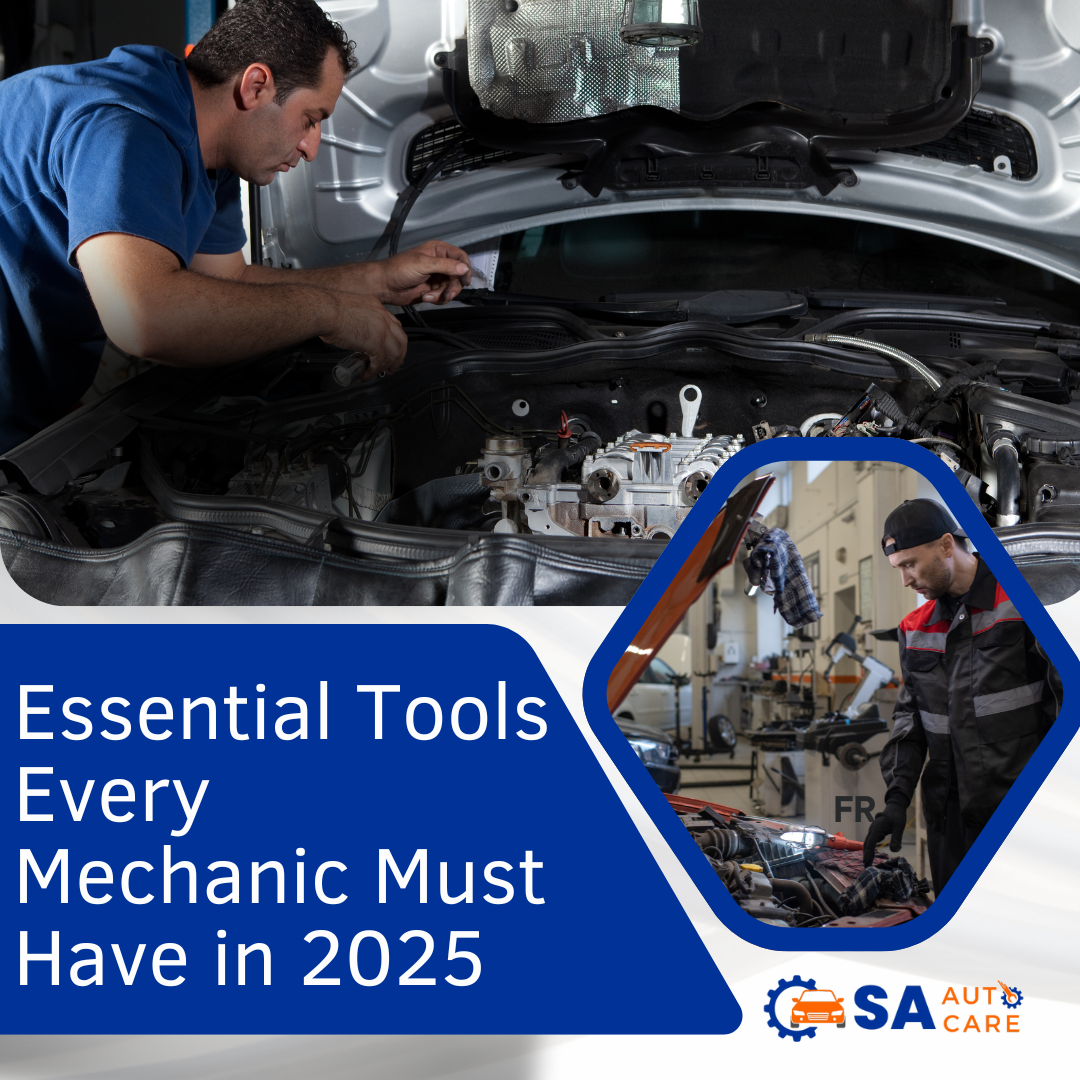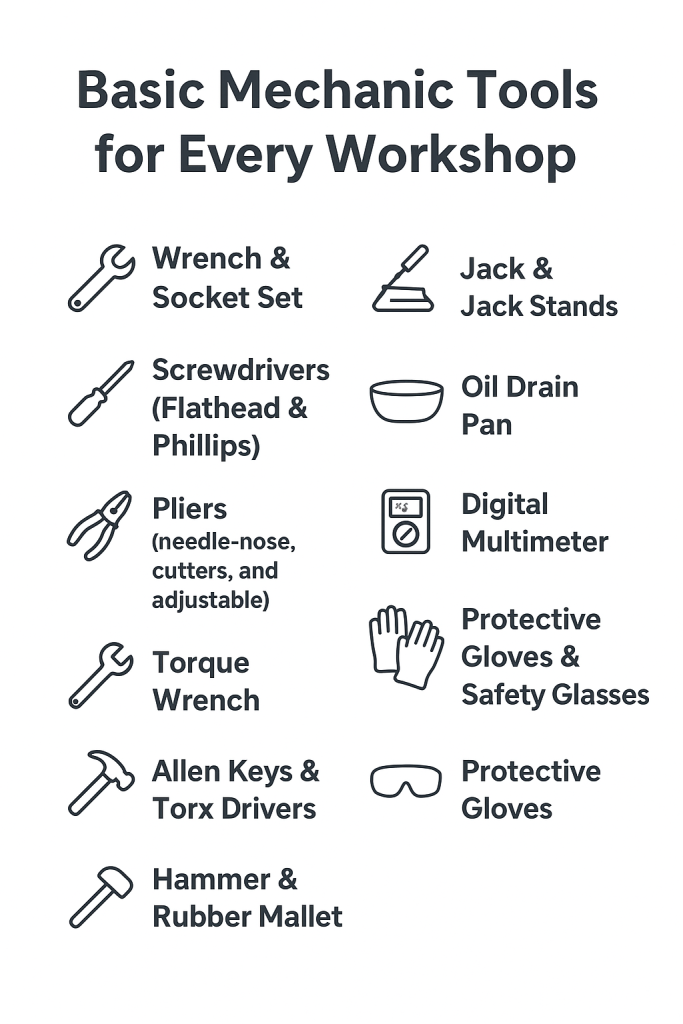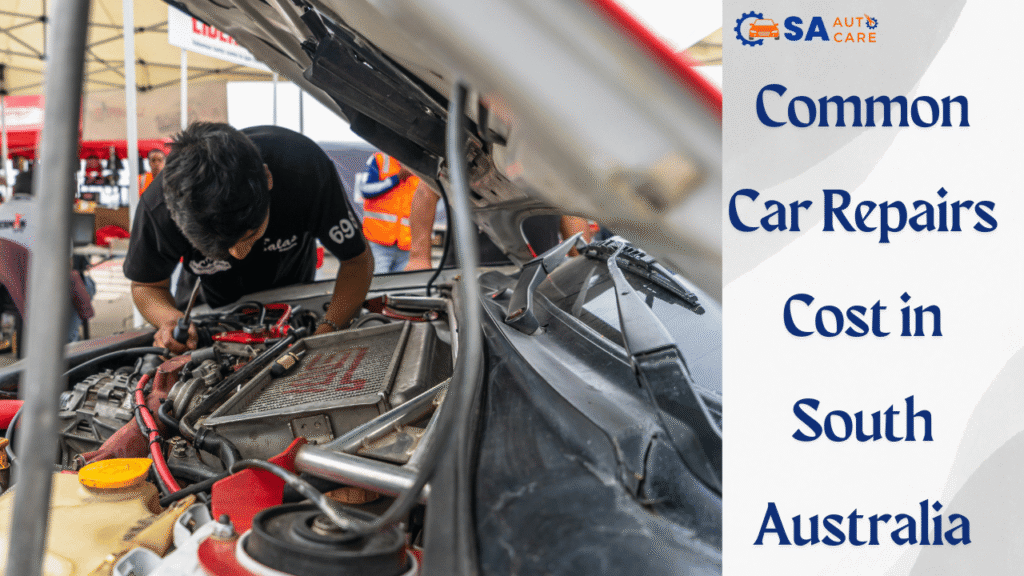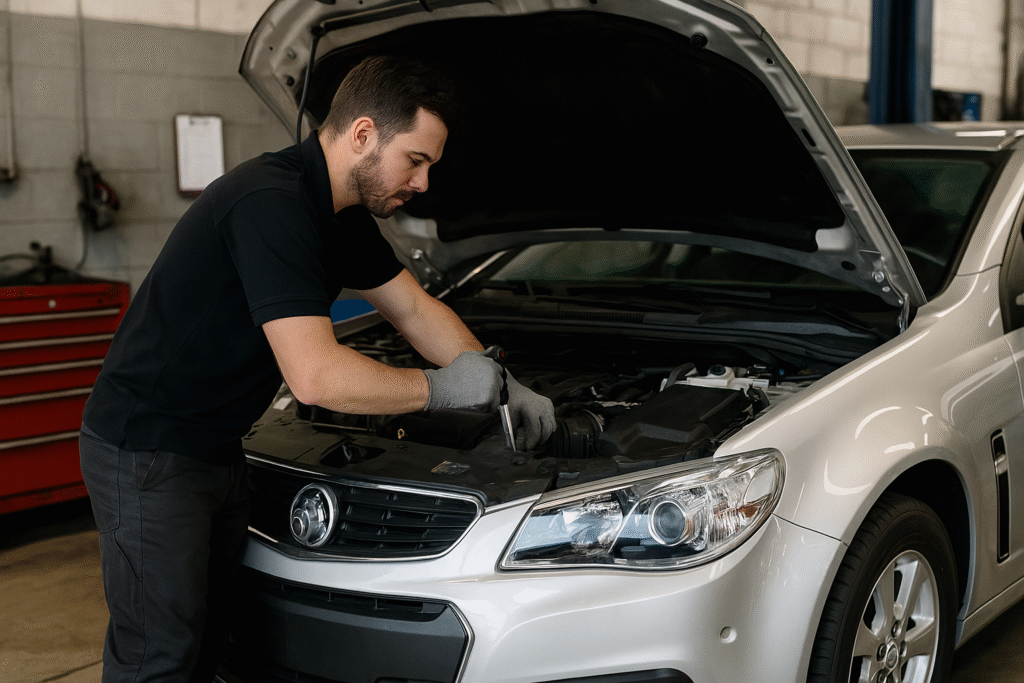Essential Tools Every Mechanic Must Have in 2025: The Complete Guide by SA Auto Care

A mechanic is only as good as the tools they use. With over a decade of experience serving Adelaide and South Australia, our workshop has seen firsthand how the right equipment can turn a complicated repair into a quick, reliable fix. According to industry reports, over 70% of modern car repairs now require specialised diagnostic tools, not just a wrench and a jack, highlighting the shift from traditional wrenches to advanced technology.
Whether it’s a simple brake service or a complex engine rebuild, using updated tools ensures precision, safety, and long-lasting results. That’s why our team invests in the latest automotive equipment every year, combining hands-on expertise with cutting-edge technology.
Whether you’re a DIY car enthusiast or just curious about what your local mechanic uses, we’ve put together a list of the essential tools every professional mechanic should have this year.
In this guide, we’ll walk you through the essential tools every mechanic must have in 2025. These are the same tools our team relies on daily to deliver safe, reliable, and efficient repairs..
Tools Every Mechanic Must Have in Hand

1. Diagnostic & Testing Tools
Modern vehicles are advanced computers on wheels. From engine control modules (ECMs) to driver-assist safety systems, most car components are now electronically monitored. According to industry data, over 70% of vehicle breakdowns in 2024 were traced back to electronic or sensor-related failures, not traditional mechanical wear.
That’s why diagnostic and testing tools form the foundation of every professional workshop. The right tools ensure accurate fault detection, reduce guesswork, and prevent unnecessary part replacements — ultimately saving customers both time and money.
Here are the essentials:
-
OBD-II Scanner (On-Board Diagnostics)
Every modern car (post-1996) comes with an OBD-II port. These scanners plug directly into the system and read error codes, identifying engine misfires, emissions problems, or even airbag faults in seconds. Without it, mechanics would be left to “trial and error.”
-
Advanced Scan Tools (Bluetooth & Cloud-Connected)
Unlike basic OBD-II readers, these tools allow deeper insights — such as coding new parts, real-time manufacturer updates, and predictive diagnostics. They connect via Bluetooth or WiFi and store results in the cloud so that mechanics can track a vehicle’s repair history across visits.
-
Digital Multimeter
A must-have for testing electrical systems. From checking battery voltage to diagnosing faulty alternators and sensors, the multimeter provides precise readings of voltage, current, and resistance, ensuring that no electrical issue is overlooked.
-
Smoke Machine for Leak Detection
Some of the most challenging issues — vacuum leaks, exhaust leaks, or hidden intake leaks — can’t be spotted with the naked eye. A smoke machine pumps visible vapor into the system, instantly revealing even the most minor crack or hole. This not only speeds up repair but also prevents costly part swaps that don’t solve the actual problem.
-
Oscilloscope (Advanced Electrical Testing)
While not every workshop invests in one, an oscilloscope is becoming more common in 2025. It provides real-time waveforms of sensor signals and ignition patterns, allowing mechanics to diagnose irregularities in milliseconds. This is especially critical for hybrid and electric vehicles.
At SA Auto Care, we rely on these diagnostic tools daily. With the proper testing setup, our certified mechanics don’t just “fix cars”, they pinpoint the exact issue the first time, giving customers confidence and reducing repeat visits.
2. Lifting & Workshop Safety Equipment
In auto repair, safety is non-negotiable. Every task that requires going underneath a vehicle demands absolute trust in the equipment. Statistics show that over 4,000 accidents in workshops each year are linked to improper lifting practices. It proves why the right tools are essential.
Here are the must-have lifting and safety tools in 2025:
-
Hydraulic Floor Jack & Jack Stands
These form the foundation of safe undercarriage work. A floor jack raises the vehicle, while sturdy jack stands secure it in place, eliminating risks of collapse. For routine jobs like oil changes, suspension checks, and tire rotation, they’re indispensable.
-
2-Post or 4-Post Vehicle Hoist
In professional garages like ours, hoists are the standard.
-
- 2-Post Hoists are ideal for mechanical repairs, offering open access to the wheels, brakes, and suspension.
- 4-Post Hoists provide more stability and are perfect for wheel alignments, inspections, and long-term vehicle storage.
- With these, mechanics can work faster, more comfortably, and more thoroughly — which means better results for customers.
-
Creeper Board
A low-profile, padded board with wheels that allows mechanics to slide easily under cars. It prevents strain on the back and keeps clothing safe from grime and sharp edges. Even a simple tool like this enhances efficiency and safety.
-
Wheel Chocks
Often overlooked, wheel chocks are a lifesaving accessory. By blocking wheels during lifting, they prevent unexpected rolling. It protects both the vehicle and the mechanic.
Without safe lifting equipment (even the simplest task) tightening a bolt, replacing a filter, or inspecting a brake line — can become dangerous. Proper hoists and safety tools protect mechanics and guarantee customers that their cars are being serviced in a professional, well-equipped environment.
At SA Auto Care, our workshop is equipped with state-of-the-art hoists, safety gear, and protective equipment. Customers can be confident knowing that every repair is done with safety as the priority.
3. Core Hand Tools (The Mechanic’s Foundation)
Technology is transforming the automotive world, but when it comes to day-to-day repairs, the classic hand tools remain the proper foundation of every workshop. According to industry surveys, over 60% of vehicle repairs still rely on traditional tools — proving that even in 2025, no mechanic can function without them.
Here’s what every professional garage keeps within arm’s reach:
-
Wrench & Socket Set
The bread and butter of mechanical work. From tightening suspension bolts to accessing engine components, a full range of sockets ensures precision. The difference between a loose and properly torqued bolt can be the difference between safety and failure.
-
Torque Wrench
One of the most underrated tools in car repair. It ensures bolts are tightened to manufacturer specifications — not too loose, not overtightened. It protects critical parts like engine heads, wheel lugs, and suspension systems from damage.
-
Screwdrivers (Flathead & Phillips)
Used for everything from dashboard panels to throttle adjustments. A professional-grade set prevents stripping screws, saving both time and costly part replacements.
-
Pliers, Cutters & Wire Strippers
Essential for handling both electrical and mechanical tasks. Whether it’s repairing wiring harnesses or gripping components in tight spaces, these tools add precision and flexibility to every job.
-
Allen Keys & Torx Drivers
Modern vehicles, especially European models, rely heavily on these specialised fasteners. Without the correct drivers, even basic maintenance becomes impossible.
These tools are the backbone of every workshop. While advanced diagnostics and lifts provide speed and accuracy, it’s the hand tools that actually bring a repair together. Without them, even the most high-tech garage would be incomplete.
At SA Auto Care, we invest in professional-grade hand tools that guarantee accuracy, durability, and efficiency.
4. Power & Pneumatic Tools (Efficiency That Saves Time & Money)
In a professional garage, speed and precision are just as important as accuracy. That’s where power and pneumatic tools play a vital role. While hand tools lay the foundation, these advanced tools are what allow mechanics to complete complex repairs quickly — without compromising on quality.
Studies show that workshops using power-assisted tools improve efficiency by up to 40%, meaning your car spends less time on the hoist and more time back on the road. At SA Auto Care, we rely on these tools daily to deliver both speed and reliability.
-
Cordless Impact Wrench
A game-changer for suspension, brake, and wheel services. Instead of spending minutes wrestling with tight bolts, an impact wrench loosens or tightens them in seconds — saving hours across a week of repairs.
-
Air Compressor & Pneumatic Tools
Despite the rise of cordless technology, air-powered tools remain indispensable. From tyre inflation and removal to bodywork and spray painting, air compressors still power many of the fastest jobs in a modern workshop.
-
Angle Grinder & Power Drill
Tough, stubborn, or rusted components don’t stand a chance. These tools cut, shape, and drill with precision, enabling repairs that would otherwise be impossible with hand tools alone.
-
Heat Gun
A surprisingly versatile tool. It helps loosen corroded bolts, remove adhesives, shrink electrical tubing, and even assist in plastic body repairs.
1Power tools directly benefit customers. Faster repairs mean lower labor costs, while precision tools ensure repairs are done right the first time.
At SA Auto Care, our investment in the latest power and pneumatic technology ensures that every repair is completed safely, efficiently, and to the highest standard..
5. Fluids & Service Tools (The Heart of Preventive Maintenance)
Every vehicle relies on clean, properly managed fluids to function at its best — oil, coolant, brake fluid, and battery charge all play critical roles in performance and safety. Neglecting them is one of the fastest ways to shorten a car’s lifespan. That’s why fluids and service tools are essential in every professional workshop.
Research shows that 40–50% of roadside breakdowns are linked to neglected fluid systems or battery failure. With the right service tools, mechanics can prevent these issues long before they put drivers at risk.
-
Oil Drain Pan & Fluid Extractor Pump
Allow for clean, safe, and environmentally responsible oil changes. A fluid extractor pump ensures not a single drop is wasted, protecting both the engine and the environment.
-
Coolant Pressure Tester
Detects leaks and ensures the cooling system maintains proper pressure. Overheating is among the most common causes of engine failure, making this tool critical for long-term vehicle health.
-
Brake Bleeder Kit
Removes air bubbles from brake lines, ensuring consistent hydraulic pressure. Safe braking isn’t optional — this kit is a lifesaver for both the mechanic and the driver.
-
Battery Tester & Charger
Modern vehicles depend on stable electrical systems more than ever. A simple test can prevent sudden battery failures that often leave drivers stranded.
Preventive maintenance may not feel urgent, but it saves drivers from costly repairs and dangerous breakdowns. By using the right tools, SA Auto Care ensures vehicles remain safe, reliable, and efficient on South Australian roads.
Customers trust us because we help them avoid problems altogether through professional, preventive car-repairing services.
6. Safety Gear & Workshop Essentials (The Mark of a Professional Workshop)
Safety is not just a regulation — it’s the foundation of professionalism in auto care. A truly reliable mechanic values both workplace safety and customer confidence. Research shows that workshop accidents drop by up to 60% when proper safety gear is consistently used, making these essentials non-negotiable for any trusted mechanic.
-
Protective Gloves, Safety Glasses & Steel-Toe Boots
These protect mechanics from sharp parts, chemical exposure, and heavy equipment accidents. A mechanic’s precision depends on their ability to work safely.
-
Fire Extinguisher & First Aid Kit
No certified workshop is complete without fire extinguisher and first aid kit. They are lifesaving essentials that every professional garage must maintain.
-
Proper Lighting (LED Work Lamps)
Vehicles have increasingly compact and complex components. Strong, targeted lighting helps mechanics inspect areas that would otherwise be overlooked, ensuring no fault is missed.
-
Tool Storage & Organisation System
A well-organised workshop is a productive one. Efficient tool storage reduces repair times, minimises errors, and assures customers they’re dealing with professional mechanics who respect their craft.
Customers immediately notice the difference between a cluttered, unsafe workshop and a professional one. At SA Auto Care, we make safety and organisation a priority, because a secure and efficient environment translates into better quality repairs, fewer mistakes, and greater customer trust.
Conclusion: The Complete Mechanic’s Toolkit in 2025
Being a great mechanic isn’t just about skill — it’s about using the right tools to deliver precise, efficient, and safe repairs. At SA Auto Care, we invest in the latest diagnostic equipment, power tools, and safety gear so that our customers always get reliable service.
If you’re an Adelaide car owner, this guide shows you the behind-the-scenes essentials that make professional repairs possible. And if you’re an aspiring mechanic, consider this your complete checklist for building a trusted career.
SA Auto Care provides faster service with the right tools that satisfy our valuable customers.
Call Us Now to Get Free Quote!
Frequently Asked Questions
Q1: Why are the right tools necessary for a mechanic?
The right tools ensure accurate diagnostics, faster repairs, and long-lasting results. At SA Auto Care, we invest in advanced equipment so every service meets professional standards and delivers reliability.
Q2: Can I do car repairs at home with these tools?
Some basic tools like wrenches, jacks, and battery testers can help with DIY maintenance, but professional repairs often require advanced equipment and trained expertise. That’s why most car owners rely on qualified mechanics.
Q3: How often should mechanical tools be updated?
On average, diagnostic and electronic tools should be updated every 3–5 years to stay compatible with modern vehicles. At SA Auto Care, our team regularly upgrades technology to keep pace with the latest automotive standards.
Q4: What’s the difference between basic and professional-grade tools?
Basic tools are suitable for minor repairs, but professional-grade tools are designed for precision, durability, and compatibility with all vehicle models. Mechanics need the latter to ensure accurate and safe results.
Q5: Does SA Auto Care use all these essential tools?
Yes. From advanced OBD-II scanners to brake service kits and suspension tools, our workshop is fully equipped. It allows us to deliver efficient, reliable, and high-quality service for every customer.







